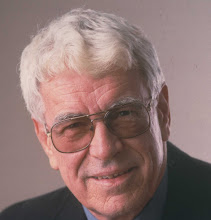December 28, 2008
On July 15, 1945, as the first atomic bomb in history seared the desert sky, Robert Oppenheimer thought: "I am become Death: the destroyer of worlds."
The line comes from the Bhagavad-Gita, and it's included in the libretto of Dr. Atomic, a phenomenal opera about Oppenheimer and the invention of the bomb. I saw Dr. Atomic in Halifax, at one of several Empire theatres in the province that offer high-definition broadcasts of Metropolitan Opera productions. Next month, Empire and the Met will offer operas by Puccini, Berlioz and Gluck. The schedule is at http://www.empiretheatres.com/empireevents/ Seeing grand opera live, on the big screen, with superb sound, is a glorious experience – and it's the only way most of us can ever really see it.
Opera, says John Adams, the composer of Dr. Atomic, has “a curious ability to handle life's biggest themes in a way no other art form can approximate” – and his theme here is the towering story of the twentieth century. Dr. Atomic evokes Faust, or Genesis, or Prometheus – legends of creation and destruction, of pride and aspiration and the mortal perils of the quest for knowledge, stories that question the very essence of human experience.
But this story is not ancient myth or drama. This is history. In outline, we all know the story – the brilliant scientists, led by Oppenheimer, sequestered in the deserts of New Mexico, working furiously to build an atomic bomb before the Nazis and the Japanese. In less than a month after their first successful test, atomic blasts vaporized Hiroshima and Nagasaki.
Those explosions brought an end to World War II, and a beginning to an era of terror which persists to this day. Before Hiroshima, wars took place on well-defined battlefields, often far across the seas. After the bomb, Armageddon lurked behind every headline, and any city might be the next Hiroshima. As a child in the Cold War, I went to sleep dreading a brilliant white flash in the middle of the night that would be the last thing I would ever see.
In Dr. Atomic, Oppenheimer is sung by Gerald Finley. The central figure in the opera, Oppenheimer was a dazzling intellect – a top-rank theoretical physicist, a brilliant administrator, a linguist and a keen lover of poetry who learned Sanskrit in order to read the Bhagavad-Gita in the original. Peter Sellars' libretto for Dr. Atomic is built from government documents, testimony and internal communications within the Manhattan Project – but also from the poets that Oppenheimer loved, notably Baudelaire, Donne and Muriel Ruykeyser.
The atomic scientists were well aware that the new weapon would cause almost unimaginable destruction and suffering, and they wrestled with that knowledge even as they pressed onward with the project. Oppenheimer himself was deeply troubled by the moral implications of the work that so consumed him, and the opera's first act concludes with Finley's passionate delivery of an aria based on Donne's Holy Sonnet XIV:
Batter my heart, three person'd God; for, you
As yet but knocke, breathe, shine, and seeke to mend...
The blast in the desert permanently changed the human relationship to the world. For the first time, humans were manipulating the very fabric of reality, transforming matter into energy, releasing powers far beyond their own comprehension. Oppenheimer's scientists worried that an atomic blast might set off a chain reaction that would in a flash consume the planet's atmosphere.
I am become Death.
Before the Manhattan Project, humans believed the world was beyond our power to harm. The fish and the forests would always regenerate. The atmosphere and the oceans were so vast that our effluents could not really damage them. After the bomb, that illusion was impossible. We went on to find many ways to endanger ourselves and the planet – poisonous chemicals, genetic engineering, greenhouse gases. The bomb opened Pandora's box, and changed the terms of human life forever.
"In some sort of crude sense, which no vulgarity, no humor, no overstatement can quite extinguish," Oppenheimer once said, "the physicists have known sin, and this is a knowledge which they cannot lose." Yes, and so have we all. Doctor Atomic delineates nothing less than a second Fall, from a second Eden. It's a mighty achievement, an unforgettable revelation. A grand opera, in every sense of the term.
-- 30 --
Sunday, December 28, 2008
Dr. Atomic
Subscribe to:
Post Comments (Atom)

No comments:
Post a Comment